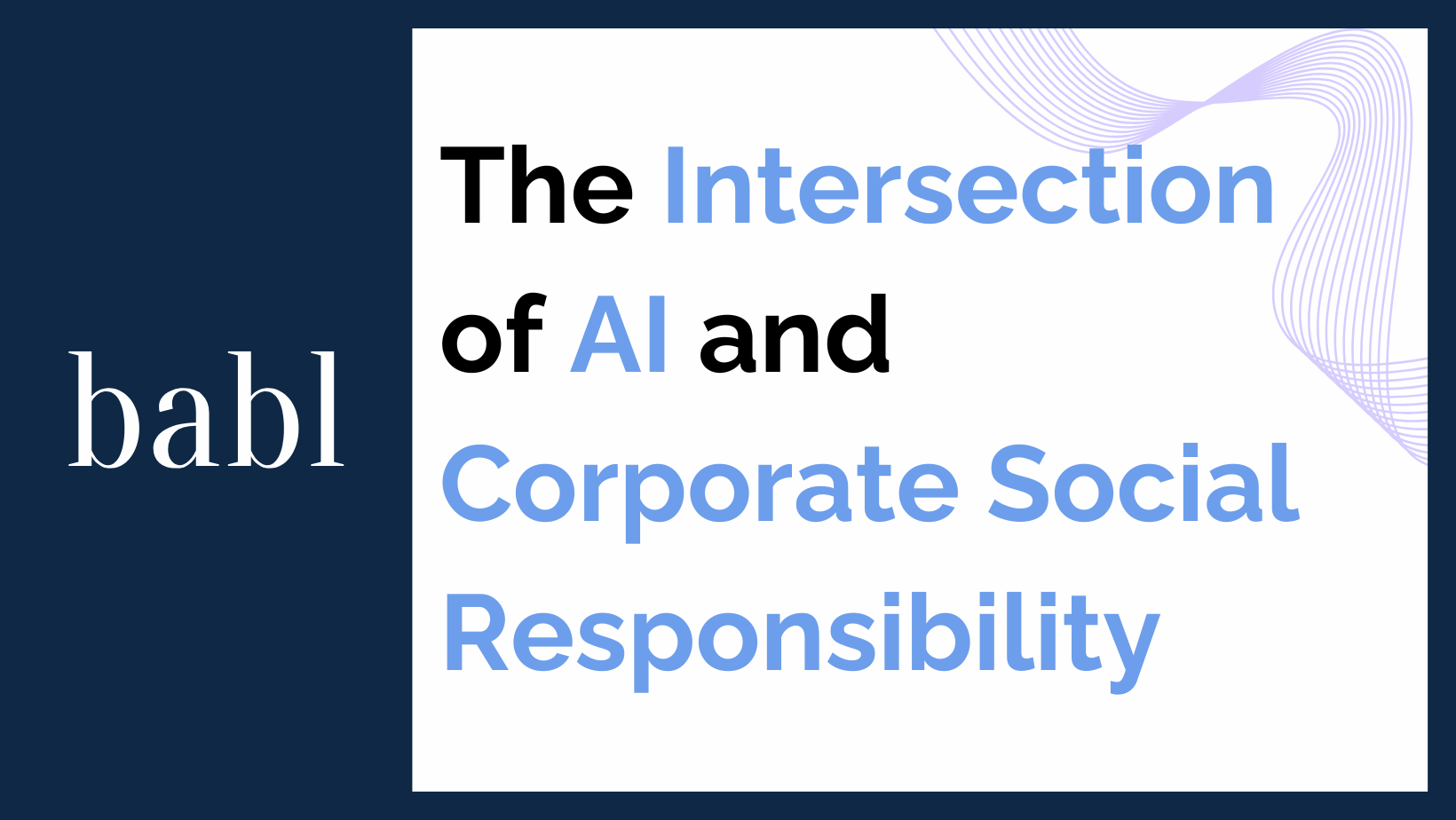As artificial intelligence (AI) continues to revolutionize industries, it also presents a unique opportunity for companies to align their technological advancements with corporate social responsibility (CSR) initiatives. The integration of AI into CSR efforts not only helps businesses address ethical concerns but also supports broader social and environmental goals. This blog post explores how AI can be incorporated into CSR strategies, focusing on ethical AI practices that enhance a company’s commitment to social and environmental responsibility.
Understanding CSR
CSR refers to a business model that encourages companies to be accountable for their impact on society, including social, environmental, and economic aspects. CSR initiatives often involve efforts to improve community welfare, support sustainable practices, and promote ethical behavior in business operations. As stakeholders increasingly demand transparency and ethical conduct, integrating CSR into business strategies has become essential for building trust and long-term success.
The Role of AI in CSR
Artificial intelligence offers powerful tools that can amplify CSR efforts. However, the deployment of AI must be approached with caution to ensure it aligns with ethical standards and societal values. Here are key areas where AI intersects with CSR:
- Enhancing Transparency and Accountability
AI can significantly improve transparency and accountability within organizations. For example, AI-powered analytics can track and report on a company’s environmental footprint, such as carbon emissions, water usage, and waste generation. By providing accurate and real-time data, AI helps companies monitor their progress towards sustainability goals and ensures that they are held accountable for their environmental impact.
Additionally, AI can be used to analyze supply chains, identifying potential ethical issues such as labor violations or environmental hazards. This enables companies to take proactive steps to address these issues and ensure that their supply chains are aligned with CSR principles.
- Promoting Ethical AI Practices
Integrating AI into CSR initiatives involves promoting ethical AI practices that prevent harm and ensure fairness. This includes conducting bias audits to identify and mitigate biases in AI systems, particularly those used in decision-making processes like hiring, lending, and law enforcement. Ensuring that AI systems are fair and unbiased aligns with CSR goals by promoting social equity and protecting individual rights.
Moreover, companies can adopt ethical AI guidelines that outline principles such as transparency, accountability, and respect for privacy. These guidelines should be integrated into the development and deployment of AI technologies, ensuring that they are used responsibly and ethically.
- Supporting Social Good Initiatives
AI can be a powerful tool for supporting social good initiatives. For instance, AI algorithms can be used to analyze large datasets to identify trends and insights that can inform public health interventions, disaster response efforts, and educational programs. By leveraging AI for social good, companies can contribute to societal welfare and demonstrate their commitment to CSR.
In the healthcare sector, AI can assist in diagnosing diseases, predicting outbreaks, and personalizing treatments, thereby improving patient outcomes and reducing healthcare disparities. In education, AI-powered tools can provide personalized learning experiences, helping bridge gaps in access to quality education.
- Fostering Sustainable Practices
AI technologies can also be leveraged to promote sustainability. For example, AI can optimize energy consumption in buildings, reduce waste in manufacturing processes, and improve the efficiency of logistics and transportation. By incorporating AI into sustainability initiatives, companies can reduce their environmental impact and support global efforts to combat climate change.
Additionally, AI can be used to develop innovative solutions for renewable energy, such as optimizing solar panel placement or predicting energy demand patterns. These applications not only contribute to environmental sustainability but also align with CSR goals by promoting responsible resource use.
Challenges and Considerations
While AI offers numerous benefits for CSR, there are also challenges and ethical considerations that companies must address:
Data Privacy and Security
The use of AI often involves collecting and analyzing large amounts of data, which raises concerns about data privacy and security. Companies must ensure that they handle data responsibly, protecting it from unauthorized access and misuse. This includes implementing robust data governance frameworks and complying with relevant data protection regulations.
Addressing Bias and Discrimination
AI systems can inadvertently perpetuate biases present in the data they are trained on. It is crucial for companies to implement bias mitigation strategies, such as using diverse datasets and involving interdisciplinary teams in the development process. Regular audits and continuous monitoring can help identify and address biases, ensuring that AI systems promote fairness and equity.
Transparency and Explainability
AI systems can be complex and opaque, making it challenging to understand how decisions are made. To build trust with stakeholders, companies must prioritize transparency and explainability in their AI systems. This involves providing clear explanations of how AI models work, the data they use, and the decisions they make.
Ethical Leadership and Governance
Effective integration of AI into CSR requires strong ethical leadership and governance. Companies should establish dedicated teams or committees responsible for overseeing AI ethics and CSR initiatives. These teams should include diverse perspectives and expertise, ensuring that ethical considerations are thoroughly examined and addressed.
Conclusion
The intersection of AI and corporate social responsibility presents both opportunities and challenges for businesses. By integrating AI into CSR initiatives, companies can enhance transparency, promote ethical practices, support social good, and foster sustainability. However, it is essential to address the ethical considerations associated with AI, including data privacy, bias, and transparency. By doing so, businesses can leverage AI responsibly and align their technological advancements with broader social and environmental goals. This approach not only fulfills CSR commitments but also builds trust with stakeholders, strengthens brand reputation, and contributes to long-term business success.
Need Help?
If you want to have a competitive edge when it comes to AI regulations and laws, don’t hesitate to reach out to BABL AI. Their team of Audit Experts can provide valuable insights on implementing AI.





